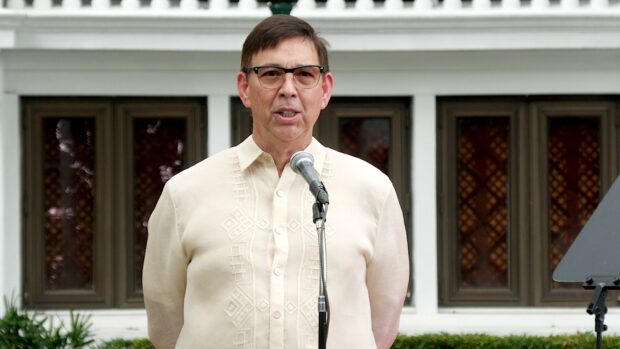
Finance Secretary Ralph Recto. (File photo by RYAN LEAGOGO / INQUIRER.net)
MANILA, Philippines — The Marcos administration would not impose new taxes as part of efforts to repair the economy after the pandemic, Finance Secretary Ralph Recto said on Wednesday, adding the government would instead improve collection efficiency rather than create new imposts that might stoke inflation.
Recto took the finance portfolio on Jan. 15 and said the plan was to “collect what’s on the table” and not burden Filipinos reeling from high prices with new consumption taxes.
To meet the department’s target revenue of P4.3 trillion this year, Recto said the government would pursue some tax reforms and “intensify implementation of digitalization initiatives, strengthen enforcement efforts, improve the administration of taxes and intensify its anticorruption drive.”
“Recognizing the current economic challenges, we must not rely solely on imposing new or additional taxes,” Recto said in a press conference.
Documents from the Department of Budget and Management showed the Bureau of Internal Revenue is tasked to generate the bulk of the tax revenues amounting to P3.05 trillion in 2024.
The Bureau of Customs is expected to collect close to P1 trillion from import duties, while the National Treasury is to raise P300 billion from sources such as dividends remitted by state-controlled firms.
Days after being named the new finance chief, legislators warned Recto against creating new taxes during high inflation.
Recto, a veteran lawmaker, authored the unpopular expanded value-added tax (VAT) law that supposedly cost him his reelection bid in 2007.
Pending tax measures
Asked whether he would continue the proposed tax reforms of his predecessor, Recto said he would push for a “refined” version of these measures, which are targeted to be submitted to the Senate by next week.
Former Finance Secretary Benjamin Diokno had wanted President Marcos to press Congress to hasten approval of new tax measures such as Package 4 of the Comprehensive Tax Reform Program (CTRP); the VAT on digital service providers, and excise tax on single-use plastic bags and on sweetened beverages and junk food.
Diokno was also pushing for Package 3 of the CTRP, the Real Property Valuation and Assessment Reform, and the VAT refund for foreign tourists.
But Recto said the proposed excise levies on sweet drinks and junk food would not be considered part of his planned tax reforms, noting that the executive department did not prepare a bill on this during his predecessor’s time.
But Recto said he would support the proposals to collect excise taxes on single-use plastics and VAT on digital service providers because “they’re minimal.”
A bill taxing single-use plastic had been approved by the House in 2022. It is now pending at the committee level in the Senate. Senators are expected to tackle the proposed VAT on digital service providers at the plenary early this year.
“Well, yes, we will continue to pursue the tax proposals of the [Department of Finance]. But we will refine them. In fact, we’ve put in a lot of work in the last few days refining these proposals already,” Recto said.
More price hikes
“So, the fine-tuning will be on what is fairer, number one. What is easy to collect, number two. And what is practical,” he added.
But while the finance department is working on measures to prevent stoking inflation, the Department of Trade and Industry (DTI) said on Wednesday that it approved price increases for more consumer goods such as canned sardines, powdered milk, and toilet soap.
It was the latest in what could be a series of upward adjustments in the coming months.
Last week, the DTI announced price increases or product size reductions for coffee and salt as manufacturers sought to raise the prices of essential commodities due to rising costs.
Trade Assistant Secretary Amanda Nograles said the agency had approved the petitions filed by manufacturers of nine stock-keeping units (SKUs) included in the government’s suggested retail price (SRP) bulletin falling under these additional commodity groups.
An SKU is a technical term used by stores to identify and categorize specific inventories by brand, product type, and weight.
“The reason is still because of the increasing price of raw materials,” Nograles told reporters following a meeting of the National Price Coordinating Council, which is headed by the DTI.
Specifically, she said the prices of four out of 15 SKUs of canned sardines would increase by P2.69 to P2.73, while one out of five SKUs of powdered milk would have an upward adjustment of P6.
Four of the 10 SKUs of toilet soap in the SRP bulletin would increase prices by P1.50.
The price changes of the two food items indicate a 14-15 percent change, while the remaining would mean a 10- percent change.
The DTI official added that there were pending price increase petitions for 45 other SKUs in the SRP bulletin, including the P2 to P2.50 price hike petition for bread products; P3.30 to P6 for milk; P0.30 to P75 for instant noodles; P6 to P33 for other canned meat products, and P1 to P6 for bottled water.
Makers of candles also ask for an increase of as much as P30.